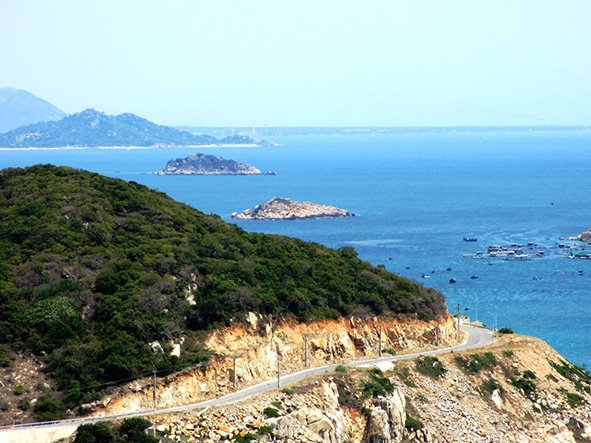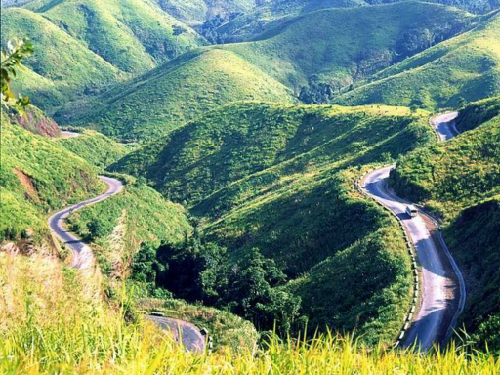The south-central region of the country is known for many magnificent winding passes that have captured the strong interest of photographers and tourists. Discovering magnificent and risky passes of the South Central Coast will give us unforgettable experience with mixed emotions as well as strengthen our love for nature.
Following are a few prominent passes that are worth visits.
Vinh Hy-Binh Tien Pass

The 16-kilometer pass runs along the coast and Chua Mountain in Ninh Thuan Province, where there are unique dry forests in Viet Nam.
Vinh Hy-Binh Tien Pass, starting from Vinh Hy Bay located 42 kilometers away from Phan Rang-Thap Cham City to the northeast, cuts through some canyons close to the shore. Travelers will be amazed by its wild beauty virtually untouched by human intervention as well as some overwhelmingly gorgeous beaches there such as Cha La, Rang, Nuoc Do, Kinh, Chuoi and Hoi, among others.
Along the pass are a number of spacious rest stops with protective railings and parking lots where travelers can freely admire spectacular views from a great height in a windy and cool atmosphere.
At the section from the peak of Chua Mountain to Binh Tien, travelers can view the southern part of Cam Ranh Bay as well as some islands and fishing villages that are described as a wonderful and poetic picture. The southern coast of Cam Ranh Bay linked with the foot of Chua Mountain is where there are a lot of fishing boats. Seafood there is extremely cheap at VND100,000 for a kilo of crabs compared to VND250,000 a kilo at some restaurants in the coastal city of Nha Trang.
Come to discover a number of scenic views along Vinh Hy-Binh Tien Pass, and you will see that landscapes in Viet Nam are actually not inferior to any other places. That could be the reason why there are quite a lot of foreigners who prefer visiting such a spectacular pass.
Ngoan Muc Pass

Situated in the west of Ninh Thuan Province on National Highway 27, the 19-kilometer Ngoan Muc Pass, which connects Ninh Son Valley in the district of the same name and the eastern part of Don Duong District in Lam Dong Province, is one of the most beautiful passes in Viet Nam. The pass called Belle Vue in French was opened in 1917 after French scientist Alexandre Yersin discovered Lang Biang Plateau in 1893.
On passing Ngoan Muc Pass, you will have a chance to see two giant hydraulic pipes bumping water from Don Duong Lake to Da Nhim hydropower plant that supplies power to the southern cities and provinces with the capacity of one billion kWh a year.
The winding road spiraling up the mountain looks like a lovely picture. Standing at a great height, you can gaze at a vast area of Phan Rang Plain and the Cai River while Phan Rang Valley is encased by mountain ranges at two sides stretching to the shore. You can also see the long coastline and white smooth sand that seems to spread endlessly. There are crystal clear streams flowing over the cliffs as well as massive areas of pine forests.
Ngoan Muc Pass is absolutely spectacular and well worth a visit for those who want to conquer such an amazing pass.
Bao Loc Pass
Bao Loc Pass is on National Highway 20 leading to Da Lat City in Lam Dong Province. The 10-kilometer winding pass has many sharp bends. Two sides of the pass are high cliffs forming deep and foggy valleys. Primitive forests remain quite prevalent on certain rugged mountains above 1,000 meters.
The Central Highlands are home to marigold. The bright yellow flower begins to bloom on roads leading to plateaus from November, which makes Bao Loc Pass absolutely beautiful and appealing to any traveler.
Mimosa Pass
Opened several years ago, Mimosa Pass is Dalat’s backdoor with wide road and moderate slope. It stretches gracefully through immense pine forests, enormous farms and colorful flower fields. Along the pass, there are wild mimosa trees which bloom with glorious yellow during spring. On the way, you will be able to meet some skillful riders who are actually Dalat girls carrying vegetables on motorbikes at 50-60 kph, when people only dare to travel at 30 kph. The pass is 11 kilometers long and ends near Frenn Fall.